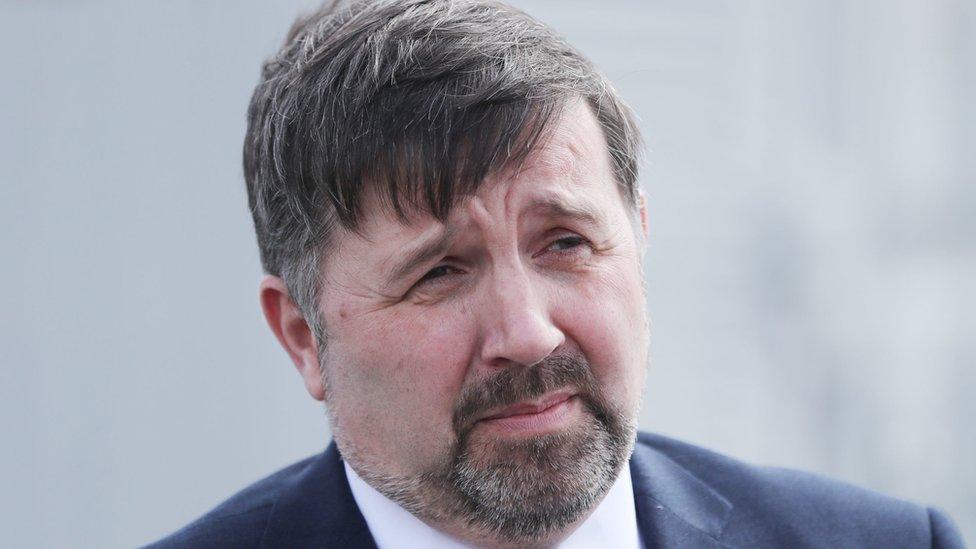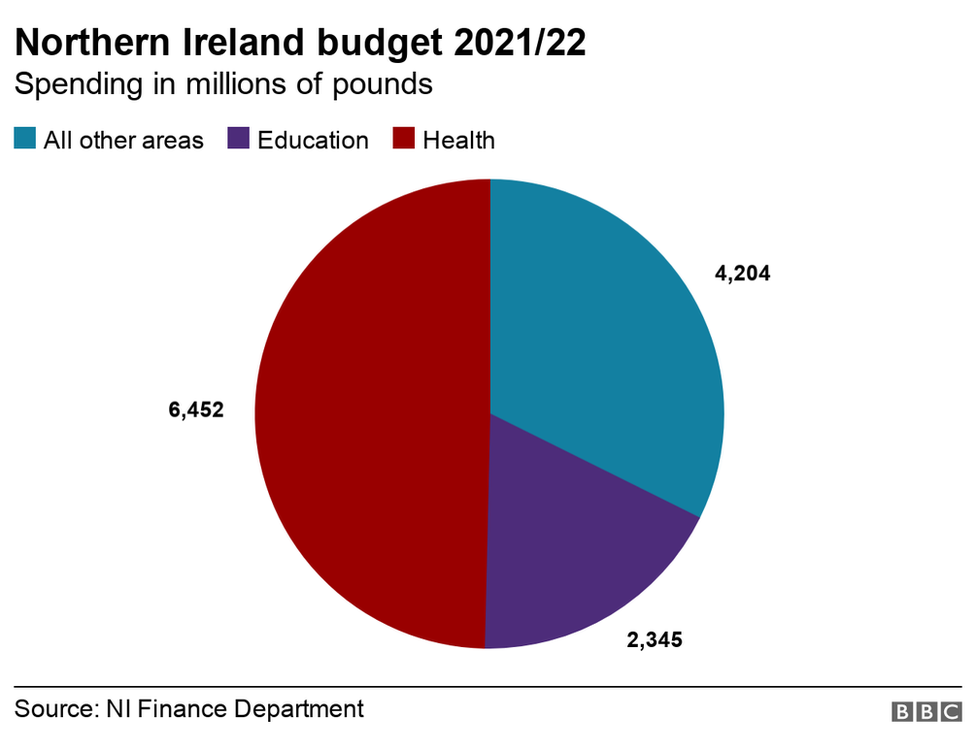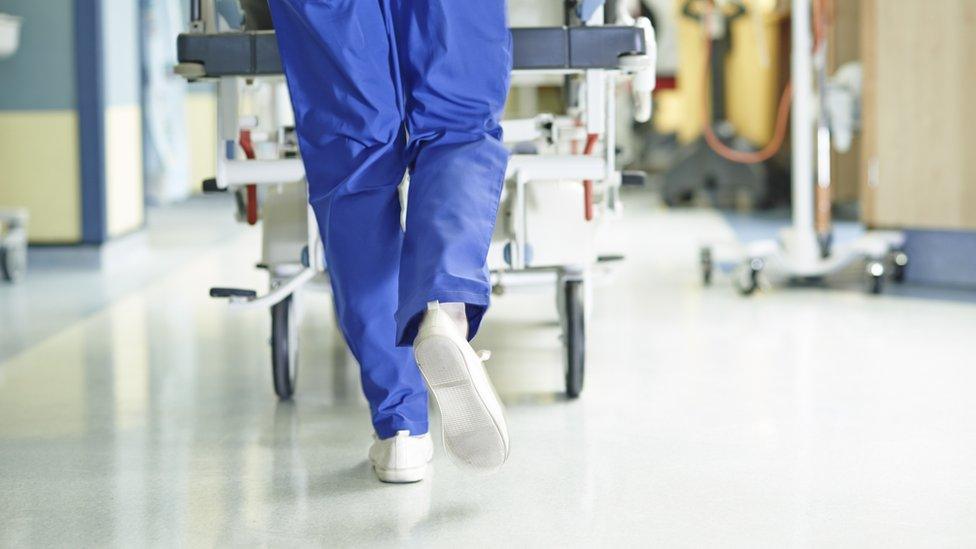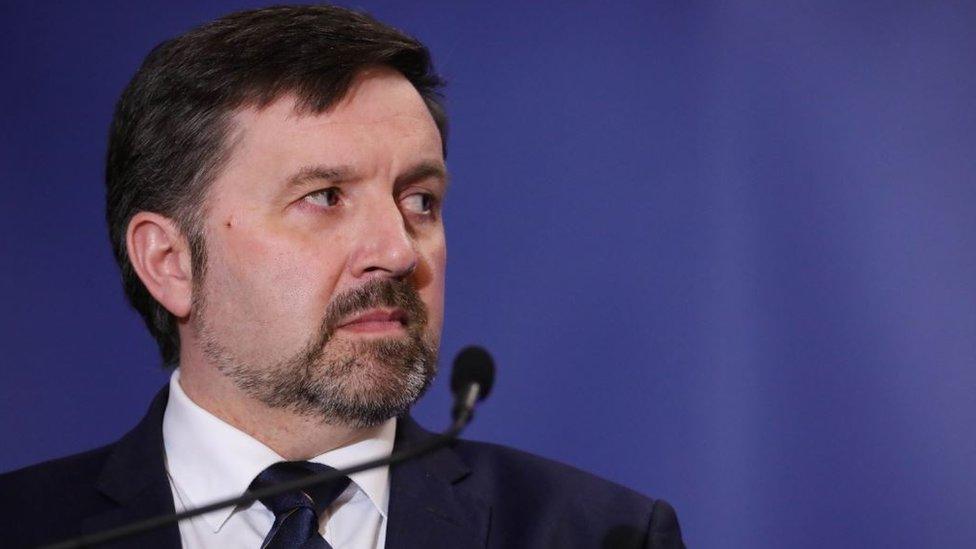Robin Swann: NI health system in 'big trouble'
- Published

Northern Ireland's health minister has told his party the health service is in "big trouble".
Robin Swann said fixing it would require "unprecedented collective action from the executive".
The warning, made in a speech to Ulster Unionist assembly members, comes as emergency departments across Northern Ireland face severe pressure for a second night.
The public has been warned to use emergency services "appropriately".
On Wednesday evening, the Health and Social Care Board advised the public that emergency departments continued "to experience severe pressures."
It is the second night in a row emergency departments have faced severe pressure.
It said the Northern Ireland Ambulance Service was also reporting "extreme pressures" and asked the public to "dial 999 in the event of an emergency, for life-threatening conditions, only".
A spokesperson added that while staff were continuing to "work hard to ensure that patients receive the treatment and care that they need, it is regrettable that some people are having to wait longer to be treated in emergency departments, or to be admitted to hospital, than normal".
Dr Paul Kerr, Vice-President of the Royal College of Emergency Medicine Northern Ireland, said record numbers of emergency admissions had been delayed by over 12-hours.
He repeated a call for "urgent action and a clear plan and support to meet the rise in demand" in emergency departments.
"Things are deteriorating very quickly; Emergency departments are facing crises over emergency cases delayed for long periods before being admitted," he said.
In his speech earlier, Mr Swann said party political point-scoring could be the "death knell" for the healthcare system.
"I'll tell you what we don't need: we don't need more party political division about health," he said.
"We don't need more cheap shots or point-scoring."
As he delivered his speech, the South Eastern Health Trust tweeted that while staff were working "extremely hard to ensure patients were being treated as quickly as possible", it said if "your condition isn't urgent, please consider other treatment options".
Allow X content?
This article contains content provided by X. We ask for your permission before anything is loaded, as they may be using cookies and other technologies. You may want to read X’s cookie policy, external and privacy policy, external before accepting. To view this content choose ‘accept and continue’.

Analysis
There is a lot of talk at the moment about what needs to be done to fix the health service; in fact according to sources a great deal of talk and very little action.
According to those working in the area, focusing on emergency departments - a so called pinch point of the health service - only diverts attention away from other areas which need fixed.
The public is turning up at emergency departments, because other doors aren't open or just as flexible.
At least if they turn up at an emergency department, some will get to see a doctor and receive face to face contact, even treatment.
So long as we focus on emergency care other areas continue to be ignored.
In order to fix the problem, the entire system needs attention.
Overnight, 420 plus people waited to be admitted to hospital across Northern Ireland.
So many people were waiting for a hospital bed because the system was unable to discharge those already receiving care.
Clearly there are too few hospital beds, too few staff, and facilities available in the community aren't sufficient.
The phone first service, the opening of urgent care centres and other initiatives for minor walk-in cases all sound good on paper, but according to those working at the centre of it, all are a distraction from the core problems of not enough hospital beds and staff.
Once again, the health minister has set out his stall.
Other parties are beginning to offer sound bites and support the minister that the system is indeed in crisis.
But words aren't enough - electioneering has begun.

It is worrying to see winter pressure warnings being made at the start of summer.
So what is causing the problem?
There are many reasons including the limitations that Covid-19 has placed on an already-stretched system, including social distancing in waiting areas and in hospital wards, and checking patients for Covid-19 when they are brought into a hospital area.
Also the fact that many admissions are elderly and frail, meaning they might take longer to triage.
Fewer hospital beds in the system and delays in discharging people out into the community are all factors that are exacerbating the problem.
There is also the post-bank holiday factor where some people have put off going to hospital despite actually ending up in an emergency facility.

Sources have told BBC News NI that in one ED (emergency department) they are treating a lot of older people who are dehydrated and confused because of sunstroke.
Another source said that while there are many acute cases that need to be admitted to hospital, there are others who are turning up and not looking to their GP first.
They said that there is a challenge locating hospital beds at present due to the "sheer volume of numbers" coming through the doors who have put off seeking care due to Covid-19.
While all those reasons are relevant, the basic problem is that the health and social care system is fragile with little room for flexibility - a situation only made a lot worse by the pandemic.
In recent weeks, emergency doctors and those working in general practice have spelt out the increasing pressure they are working under.
It seems now that Covid-19 news has calmed down, they are keen to make their concerns heard - again.
Each are reporting unprecedented numbers coming through their doors and being unable to cope.
It does sound like a cry for help.
'Too convenient to play those games'
Meanwhile, politicians are faced with fixing the crisis.
In his speech to party colleagues, the health minister said it was "too easy to angrily condemn any proposed changes to local services" or to "sprout conspiracy theories about secret plans to close or to run down smaller hospitals", which he said were untrue.
Mr Swann warned that it is all "too convenient to play those games", especially with an election coming up.
"It's the last thing we actually need right now because it's a luxury that we simply can't afford."
Related topics
- Published2 June 2021

- Published27 April 2021
